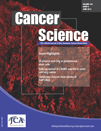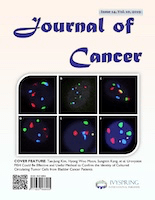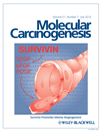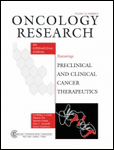
CANCER SCIENCE
Scope & Guideline
Unlocking the mysteries of cancer through rigorous research.
Introduction
Aims and Scopes
- Cancer Biology and Mechanisms:
Research articles that explore the underlying biological processes of cancer development, including genetic mutations, epigenetic modifications, and signaling pathways that drive tumorigenesis. - Therapeutic Strategies and Drug Development:
Studies evaluating novel therapeutic agents and combinations, including targeted therapies, immunotherapies, and combination treatments aimed at improving patient outcomes in various cancer types. - Tumor Microenvironment and Immune Response:
Investigations into the interactions between tumor cells and their microenvironment, including immune cell dynamics, stromal interactions, and the impact of the microenvironment on cancer progression and therapy resistance. - Clinical and Translational Research:
Clinical studies that assess treatment efficacy, biomarkers for patient stratification, and the integration of genomic profiling into clinical practice to personalize cancer therapy. - Preventive Oncology and Public Health:
Research addressing cancer prevention strategies, epidemiological studies, and the impact of lifestyle factors on cancer incidence and outcomes.
Trending and Emerging
- Liquid Biopsy and Circulating Tumor DNA (ctDNA):
The use of liquid biopsy techniques for early cancer detection, monitoring treatment response, and understanding tumor heterogeneity is increasingly prevalent, highlighting the shift towards non-invasive diagnostic methods. - Immunotherapy and Tumor Microenvironment:
Research focusing on the role of the immune system in cancer, including immune checkpoint inhibitors and the dynamics of the tumor microenvironment, is rapidly expanding as immunotherapy becomes a cornerstone of cancer treatment. - Personalized and Precision Medicine:
The integration of genomic profiling and personalized treatment regimens tailored to individual patients is a growing focus, driven by advancements in genomics and bioinformatics. - Targeting Cancer Metabolism:
Emerging studies are increasingly focused on cancer metabolism and metabolic reprogramming as therapeutic targets, exploring how metabolic pathways can be exploited for cancer treatment. - Advancements in Artificial Intelligence and Machine Learning:
The application of AI and machine learning to cancer research, particularly in diagnostics, prognostic modeling, and treatment predictions, is on the rise, reflecting technological advancements in data analysis.
Declining or Waning
- Traditional Chemotherapy Approaches:
Research focused solely on traditional chemotherapy drugs is becoming less common as new targeted therapies and personalized medicine approaches gain prominence in the field. - Single-Agent Studies:
Studies evaluating the efficacy of single-agent therapies are decreasing as combination therapies that leverage multi-modal approaches show better outcomes in clinical trials. - Basic Science Without Clinical Relevance:
Research that lacks a clear translational aspect or clinical application is being overshadowed by studies that bridge basic science with clinical insights.
Similar Journals

Journal of Cancer
Connecting researchers to transform cancer care.Journal of Cancer is a premier, peer-reviewed academic journal published by IVYSPRING INTERNATIONAL PUBLISHING that focuses on advancing the field of oncology. With an impact factor reflecting its significant contributions, this journal ranks in the 80th percentile of medical journals pertaining to oncology, positioning it at #79 out of 404 in Scopus. Since its inception in 2010, the journal has embraced an Open Access model, ensuring that groundbreaking research reaches a global audience without barriers. Based in Australia, the journal addresses a wide array of topics within cancer research, catering to researchers, healthcare professionals, and students committed to enhancing their understanding of the complexities of cancer. Amidst evolving challenges in oncology, the Journal of Cancer serves as a vital platform for disseminating innovative findings, fostering collaboration, and promoting informed decisions that can lead to improved cancer outcomes worldwide.

JOURNAL OF EXPERIMENTAL & CLINICAL CANCER RESEARCH
Fostering collaboration for groundbreaking cancer discoveries.The JOURNAL OF EXPERIMENTAL & CLINICAL CANCER RESEARCH, published by BMC, is a leading open-access journal dedicated to advancing the field of cancer research and oncology. Since its inception in 1982, this esteemed journal has fostered innovation and collaboration in the scientific community, as evidenced by its outstanding impact factor and position in the Q1 quartile for both Cancer Research and Oncology categories in 2023. With a proud commitment to disseminating high-quality research, the journal operates under an open-access model, ensuring that findings are readily accessible to researchers, healthcare professionals, and students worldwide. The journal has established a distinguished reputation, ranking 23rd out of 404 in Medicine oncology and 16th out of 230 in Biochemistry, Genetics, and Molecular Biology (cancer research), showcasing its importance and influence in guiding the future of cancer treatment and research. With the aim of bridging experimental and clinical research, this journal invites submissions that push the boundaries of our understanding of cancer biology and therapy.

MOLECULAR CARCINOGENESIS
Advancing Insights into CarcinogenesisMOLECULAR CARCINOGENESIS is a prestigious academic journal published by Wiley, dedicated to advancing the understanding of the molecular basis of cancer. Established in 1988, this journal serves as a vital resource for researchers and professionals in the fields of cancer research and molecular biology. With an impressive impact factor reflecting its significance in the Q2 category for both Cancer Research and Molecular Biology, it stands out for its high-quality, peer-reviewed articles that explore innovative research, novel findings, and emerging trends in carcinogenesis. Although the journal currently does not offer open access options, it remains accessible to the academic community through numerous institutional subscriptions. Positioned in the United States and contributing to the global discourse on cancer research, MOLECULAR CARCINOGENESIS is an essential publication for anyone engaged in the study of cancer at the molecular level.

BIOCHIMICA ET BIOPHYSICA ACTA-REVIEWS ON CANCER
Connecting Research, Treatment, and Future Directions in OncologyBIOCHIMICA ET BIOPHYSICA ACTA-REVIEWS ON CANCER, published by Elsevier, has established itself as a leading journal in the domains of cancer research, genetics, and oncology, holding a prestigious position in the Q1 quartile rankings in these fields as of 2023. With an ISSN of 0304-419X and an E-ISSN of 1879-2561, this journal aims to disseminate high-quality, impactful reviews that synthesize the latest advancements and findings in cancer biology, treatment modalities, and genomic studies. Its robust indexing and remarkable Scopus rankings—placing it in the 95th to 91st percentiles across various categories—underline its significance for researchers, clinicians, and students passionate about oncology. Operating from its Netherlands headquarters, BIOCHIMICA ET BIOPHYSICA ACTA-REVIEWS ON CANCER is dedicated to fostering a comprehensive understanding of the complex biological mechanisms underlying cancer, promoting innovative therapeutic strategies, and guiding future research directions.

NEOPLASIA
Transforming cancer research for a healthier tomorrow.NEOPLASIA is an esteemed open-access journal dedicated to advancing the field of oncology, published by Elsevier Science Inc. since 1999. With an impressive impact factor and recognition as a Q1 journal in Cancer Research for 2023, it holds a significant position within the scientific community, specifically ranking in the 74th percentile globally in the categories of Biochemistry, Genetics, and Molecular Biology. NEOPLASIA seeks to provide a comprehensive platform for innovative research, covering a wide array of topics in cancer biology, treatment methodologies, and therapeutic advancements. Researchers, professionals, and students are encouraged to utilize this resource, which is easily accessible to foster collaboration and stimulate progress in cancer research. As it converges its efforts towards the future of oncology, this journal is poised to remain at the forefront of transformative discoveries that shape our understanding and treatment of cancer.

ONCOLOGY RESEARCH
Fostering Excellence in Oncology Research and PracticeONCOLOGY RESEARCH, published by TECH SCIENCE PRESS, is a vital academic journal dedicated to the rapidly evolving field of oncology. With its ISSN 0965-0407 and E-ISSN 1555-3906, the journal serves as a key resource for researchers, clinicians, and academicians committed to advancing cancer research and treatment strategies. Operating without an Open Access model, ONCOLOGY RESEARCH provides high-quality, peer-reviewed articles that cover diverse topics within cancer research, medicine, and oncology, with its 2023 Scopus ranking placing it in the Q3 quartile. The journal's commitment to facilitating rigorous scientific discourse is evident in its historical breadth, with a publishing history dating back to 1992. ONCOLOGY RESEARCH is not only significant for the academic community but also plays a critical role in fostering new insights and approaches in the fight against cancer, making it a must-read for those involved in this critical area of study.

Advances in Cancer Biology-Metastasis
Connecting Research to Real-World Impact.Advances in Cancer Biology-Metastasis is an emerging journal published by Elsevier, aimed at advancing our understanding of the complexities of cancer biology, with a specific focus on the mechanisms and pathways related to metastasis. With an E-ISSN of 2667-3940, this journal offers a platform for researchers, professionals, and students in the fields of Cancer Research and Cell Biology to disseminate innovative findings and discuss novel therapeutic approaches. Though currently classified in the Q4 quartile across both Cancer Research and Cell Biology categories, the journal aspires to enhance its impact through rigorous peer review and high-quality publication. Positioned to cover the years from 2021 to 2024, it seeks to bridge gaps in foundational knowledge and promote collaborative research efforts that could pivot the current understanding of cancer metastasis. Researchers are encouraged to take advantage of this platform to advocate for advancements in cancer biology, making significant contributions that can influence both academic and clinical practices.

Cancer Cell International
Pioneering Insights in Cancer Cell BiologyCancer Cell International, published by BMC, is a transformative open-access journal established in 2001, dedicated to advancing the field of oncology and cancer research. With its ISSN number not specified and an E-ISSN of 1475-2867, the journal proudly operates from the United Kingdom, located at CAMPUS, 4 Crinan St, London N1 9XW, England. Renowned for its rigorous peer-review process, Cancer Cell International has made significant strides, securing a Q2 ranking in Cancer Research and Q1 rankings in both Genetics and Oncology as of 2023. It ranks impressively in Scopus, featuring in the top quintile of Genetics (#37/347) and Oncology (#52/404), indicating its importance within the scientific community. The journal's broad scope caters to a diverse array of topics within cancer biology, making it an invaluable resource for researchers, professionals, and students seeking to stay at the forefront of cancer science. With a commitment to disseminating high-quality research, Cancer Cell International invites scholars to explore innovative findings and contribute to the collective effort of combating cancer.

Molecular Cancer
Pioneering open access to vital cancer insights.Molecular Cancer, published by BMC, stands as a premier open access journal dedicated to advancing our understanding of cancer biology, treatment, and prevention since its inception in 2002. With an impressive Q1 ranking in the domains of Cancer Research, Molecular Medicine, and Oncology, this journal occupies a significant position in the academic landscape, emphasizing high-quality research that influences clinical practices and future studies. The journal is indexed in leading databases with exceptional Scopus ranks, reflecting its rigorous peer-review process and impactful contributions to the field, where it ranks in the top 2-3 positions across various relevant categories. Based in the United Kingdom, Molecular Cancer offers researchers worldwide a valuable platform for disseminating innovative findings that drive the biomedical community forward. The journal's open access model ensures that groundbreaking research is freely accessible, fostering collaboration and knowledge sharing among professionals, students, and academics alike. Explore cutting-edge developments in cancer research through Molecular Cancer and join a community committed to improving patient outcomes and advancing scientific discovery.

BMC CANCER is a prestigious, peer-reviewed journal dedicated to advancing the field of cancer research and oncology since its inception in 2001. Published by BMC, a leading name in open-access publishing, this journal plays a crucial role in providing researchers, professionals, and students with a platform for high-quality scientific discourse. With an impressive impact factor, BMC CANCER is ranked in the Q2 quartile across multiple categories, including Cancer Research, Genetics, and Oncology, reflecting its commitment to impactful research and rigorous peer-review standards. The journal ensures broad accessibility to its content through its Open Access model, allowing findings to reach a global audience without financial barriers. The editorial board consists of recognized experts committed to fostering innovation and collaboration within the cancer research community. Researchers working at the intersection of cancer biology, treatment options, and genetic influences will find BMC CANCER an invaluable resource for sharing their findings and engaging with the latest developments in the field.